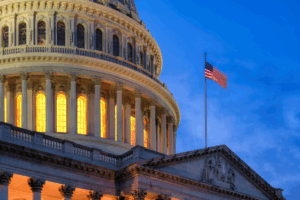
On May 22, the House passed its version of the “One Big Beautiful Bill” (OBBB) which included a large section on tax extenders. Last week, the Senate Finance Committee passed its version of tax provisions, with the full bill expected to go to a floor vote before June 28. Now, both chambers will work to reconcile their versions, aiming to deliver a final bill to the President by July 4th. While the full text is extensive, here’s some notable details for individual taxpayers to be aware of.
Tax Credits on the Way Out
Several popular tax credits are being phased out or terminated:
- Clean Vehicle Credit: The Senate version has this credit ending 90 days after enactment for used vehicles, and 180 days for new and commercial vehicles. The House proposed ending December 31, 2025.
- Energy Efficient Home Improvement Credit: The Senate proposes ending 180 days after enactment (includes windows, doors, insulation, HVAC). The House proposed ending December 31, 2025.
What’s Staying (and Improving)
- Tax Brackets: The current structure, including the top 37% rate, remains in both versions.
- Standard Deduction:
- In the Senate version, the standard deduction sees a significant increase beginning in 2026: $32,000 for Married Filing Jointly (MFJ), $24,000 for Head of Household (HOH), and $16,000 for all other filers.
- In contrast, the House version maintains the current standard deduction structure but introduces a temporary increase for tax years 2025 through 2028. During this period, the deduction would rise be $26,000 for MFJ, $19,500 for HOH, and $13,000 for all others. After 2028, the deduction would revert to its current levels unless further legislation is passed.
- Child Tax Credit:
- In the House version, the Child Tax Credit is increased to $2,500 per child for tax years 2025 through 2028. After that, it reverts to $2,000 annually, with adjustments for cost-of-living increases.
- The Senate version sets the Child Tax Credit at $2,200 beginning in 2026, without a scheduled reduction.
- 100% Bonus Depreciation: Both chambers agree to restore 100% bonus depreciation for qualifying property placed in service on or after January 20, 2025. The Senate version goes further by making the provision permanent, while the House version does not include language to make it permanent.
- Section 179 Expensing: The House and Senate proposals are largely aligned in their intent and structure. Both chambers propose increasing the expensing limit to $2.5 million, with a phase-out threshold beginning at $4 million.
- Section 199A: The House and Senate proposals for Section 199A (Qualified Business Income Deduction, or QBID) both aim to make the deduction permanent.
- The House version proposes increasing the deduction rate from 20% to 23%, indexing the income thresholds to inflation after 2025, and adjusting the treatment of REIT dividends and phase-in calculations.
- The Senate version retains the current 20% deduction rate but introduces a $25,000 increase in the phase-out thresholds per filer and establishes a minimum QBID of $400 for taxpayers with at least $1,000 in qualified business income.
- Estate Tax Exclusion: The House version proposes increasing the estate and gift tax exemption to $15 million per individual, indexed for inflation after 2025, an increase from the current exemption of $13.99 million. The Senate version closely aligns with this figure but may differ in how inflation adjustments are calculated. Both proposals retain the 40% tax rate on estates exceeding the exemption amount.
New Benefits for Individuals
- No Tax on Tips: The Senate version of the bill exempts up to $25,000 in tips per person from taxable income, while the House version also includes a similar provision, though it does not specify a dollar amount.
- No Tax on Overtime: The Senate version of the bill exempts up to $12,500 in overtime pay per person from taxable income, while the House version includes a similar provision, though it does not specify a dollar amount.
- Senior Deduction: The Senate version of the bill offers a senior deduction of $6,000 through 2028, with a phase-out based on modified adjusted gross income (MAGI), while the House version provides a $4,000 senior deduction beginning in 2025.
- Car Loan Interest Deduction: Beginning in 2025, both the House and Senate proposals include a car loan interest deduction of up to $10,000 for qualified vehicles. The House version applies this deduction without requiring itemization and includes a phase-out for taxpayers with incomes between $100,000 and $150,000. The Senate version mirrors these terms but specifies that the deduction would be available from 2025 through 2028.
Taxpayer Requirements and Revisions
- Earned Income Tax Credit (EITC): Beginning in 2028, both the House and Senate versions of the bill require taxpayers claiming a child under the EITC to obtain an official EITC Certificate before they can claim the credit on their tax return.
- Education Credits: The Senate version of the One Big Beautiful Bill introduces new requirements for claiming education-related tax credits. Specifically, taxpayers must provide valid Social Security Numbers (SSNs) for both the individuals filing the return—including spouses filing separately—and the qualifying student. Additionally, the Employer Identification Number (EIN) of the educational institution must be included when filing.
- Charitable Deduction for Non-Itemizers: The Senate version allows an above the line deduction for up to $1,000 ($2,000 MFJ) starting in 2026.
- State and Local Tax (SALT) Deduction Cap: The House plan raises the cap to $40,400 per return (or $20,200 for married filing separately) starting in 2025, with a phase-out beginning at $505,000 of modified adjusted gross income. The Senate version retains the existing $10,000 SALT cap and includes stricter limitations on SALT cap workaround strategies, such as limiting pass-through entity (PTE) deductions.
What this means for you
If you’re an individual taxpayer, the “One Big Beautiful Bill” could bring meaningful changes to your tax return in the coming years.
You may benefit from new exclusions on tips and overtime pay, expanded deductions for seniors, and a potential deduction for car loan interest—especially if your income falls within the phase-out thresholds. Families with children should pay close attention to the changes in the Child Tax Credit, which vary in amount and duration depending on which version of the bill prevails.
If you’ve been planning energy-efficient home upgrades or solar installations, you’ll want to act quickly—all of those credits are being phased out. And if you claim education credits or the Earned Income Tax Credit, be prepared for new documentation requirements starting in the next few years.
While the House and Senate still need to reconcile their versions, most of the provisions are expected to remain largely intact.
We’re here to help
Now is a great time to connect with a trusted tax advisor to understand how these proposed changes could impact your 2025 and 2026 returns—and to plan ahead for any opportunities or compliance updates. The team at Christianson is here to help you navigate the evolving tax landscape with clarity and confidence.
Whether you have questions about deductions, credits, or planning strategies, our experts are ready to guide you every step of the way.







